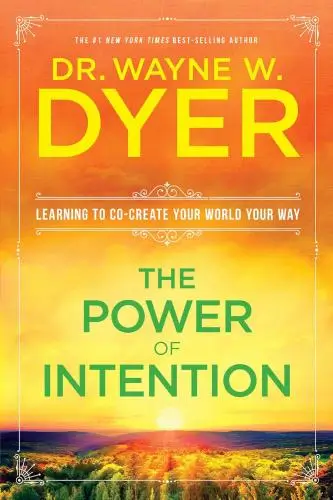
The Power of Intention
What's it about?
The Power of Intention is a transformative guide that teaches readers how to harness the power of intention to create the life they desire. Through a combination of spiritual principles and practical exercises, Dyer explains how setting clear intentions can help manifest positive outcomes in every aspect of life. By shifting our mindset and focusing on our desires, we can tap into the infinite potential of the universe and attract abundance, joy, and fulfillment. This book is a must-read for anyone looking to cultivate a deeper sense of purpose and manifest their dreams into reality.
About the Author
Wayne Dyer was an American self-help author and motivational speaker, best known for his book "Your Erroneous Zones." His work often focused on self-development, spiritual growth, and the power of positive thinking. Dyer's approach blended psychology, philosophy, and spirituality, offering practical advice for personal transformation and fulfillment.
10 Key Ideas of The Power of Intention
Practice Regular Meditation to Connect with Intention
Meditation is a powerful tool for connecting with the source of intention.
It helps quiet the mind, reduce stress, and foster a deeper sense of inner peace.
Through regular meditation, you can enhance your ability to listen to your intuition and receive guidance from the universal mind.
This connection to a higher intelligence empowers you to manifest your desires with greater ease and clarity.
Aim to meditate daily, even if it's just for a few minutes, to maintain this vital connection.
Learn DeeperSet a Regular Meditation Schedule: Choose a specific time each day for meditation, making it as much a part of your routine as brushing your teeth. Early morning or before bedtime are often ideal times for many.
Create a Dedicated Meditation Space: Find a quiet, comfortable spot in your home where you can sit undisturbed. This could be a corner of your bedroom, a special chair, or even a closet space transformed into a mini-sanctuary.
Start Small and Be Patient: Begin with just 5 minutes of meditation daily. Focus on your breath, and when your mind wanders, gently bring your attention back. Gradually increase the time as you become more comfortable with the practice.
Use Guided Meditations: If you find it difficult to quiet your mind, consider using guided meditations. There are numerous apps and online resources available that can lead you through various meditation exercises.
Journal Post-Meditation: After each session, spend a few minutes writing down any thoughts, feelings, or insights that arose during your meditation. This can help deepen your understanding and connection to your intentions.
- Example
Imagine setting your alarm 15 minutes earlier than usual to incorporate meditation into your morning routine. You sit in a designated corner of your living room, where a comfortable cushion and a small plant create a peaceful atmosphere. As you focus on your breath, you gradually feel more centered and connected to your day's intentions.
- Example
After a long day at work, you retreat to a quiet spot in your home where a soft blanket and a dimly lit lamp await. You play a guided meditation focusing on gratitude from your favorite meditation app. As you follow the guide's prompts, you find yourself feeling more relaxed and appreciative of the day's experiences, reinforcing your connection to positive intentions.
Act As If Your Desires Are Already Manifested
Behaving as if your desires have already come to pass sends a powerful message to the universe.
This act of faith reinforces your belief in the power of intention and attracts the necessary resources and opportunities to make your dreams a reality.
It involves living with the joy, gratitude, and confidence that would accompany the achievement of your goals.
This approach not only improves your vibrational frequency but also motivates you to take inspired action towards your aspirations.
Learn DeeperVisualize Your Success Daily: Spend a few minutes each day closing your eyes and vividly imagining your life as if your goals have already been achieved. Feel the emotions, see the outcomes, and experience the joy and gratitude.
Speak in the Present Tense About Your Goals: When talking about your aspirations, use language that reflects their achievement. For example, instead of saying 'I want to be successful,' say 'I am successful in my endeavors.'
Create a Vision Board: Compile images, quotes, and symbols that represent your achieved goals. Place this board somewhere you can see it daily to remind yourself of the reality you're moving towards.
Act on Your Goals: Take steps each day that align with your goals as if failure is not an option. This could mean networking for your dream job, investing in your education, or practicing skills relevant to your aspirations.
- Example
If you're aspiring to become a published author, start introducing yourself as one in conversations related to your field. Additionally, dedicate time each day to write, as if you already have a book deal in place.
- Example
For someone aiming to run a marathon, begin training as if the marathon date is already set. Share your training progress and milestones with friends and family as if you're already in the final preparation stages.
Use Affirmations to Reinforce Your Intentions
Affirmations are positive statements that describe a desired situation or goal in the present tense as though it's already happening.
Repeating these affirmations daily programs your subconscious mind to believe in the possibility of achieving your intentions.
This belief then influences your thoughts and actions, bringing you closer to your goals.
For maximum effectiveness, craft affirmations that resonate deeply with you and recite them with conviction and emotion.
Learn DeeperIdentify Your Intentions: Start by clearly defining what you want to achieve. Whether it's improving your health, advancing in your career, or fostering better relationships, having a clear intention is the first step.
Craft Your Affirmations: Once you know your intentions, create affirmations that align with them. Use positive, present tense language that embodies the achievement of your goals. For example, if your intention is to become more confident, your affirmation could be, 'I am confident in my abilities and decisions.'
Set Aside Time for Daily Recitation: Dedicate a few minutes each day, preferably in the morning or before bed, to recite your affirmations. This helps set a positive tone for your day or soothes your mind before sleep.
Visualize Your Success: As you recite your affirmations, visualize yourself achieving your intentions. Imagine how it feels, what you see, and who is with you. This visualization process enhances the impact of your affirmations.
Reflect and Adjust: Regularly reflect on your progress and feelings. If an affirmation doesn't resonate as strongly with you anymore, adjust it to better suit your evolving goals or emotional state.
- Example
If your goal is to improve your physical fitness, an affirmation might be, 'I am enjoying a healthy and active lifestyle every day.' Visualize yourself exercising, feeling energized, and enjoying nutritious meals.
- Example
For someone aiming to advance in their career, an affirmation could be, 'I am excelling in my role and making valuable contributions to my team.' Imagine yourself completing projects successfully, receiving positive feedback, and feeling fulfilled by your work.
Let Go of Your Ego to Align with Universal Will
The ego often operates from a place of fear, scarcity, and competition, which can hinder your ability to manifest your desires.
Letting go of ego-based thoughts and behaviors allows you to align more closely with the universal will, which operates from love, abundance, and cooperation.
This alignment opens you up to infinite possibilities and supports the manifestation process.
Practice mindfulness and self-awareness to recognize when your ego is in control and consciously choose to shift back to a state of openness and receptivity.
Learn DeeperPractice Mindfulness Daily: Start by dedicating a few minutes each day to mindfulness meditation. Focus on your breath and observe your thoughts without judgment. This practice helps you become more aware of when your ego is taking over and allows you to consciously choose to let go of those thoughts.
Cultivate Gratitude: Make it a habit to list at least three things you're grateful for each day. Gratitude shifts your focus from what you lack (a common ego trap) to the abundance that is already present in your life, aligning you more closely with universal will.
Engage in Acts of Kindness: Perform at least one act of kindness daily without expecting anything in return. This helps diminish the ego's hold by fostering a sense of connection and cooperation with others, reflecting the essence of universal will.
Reflect on Your Intentions: Regularly ask yourself why you want the things you desire. Are these desires coming from a place of ego, such as wanting to be better than others, or from a genuine place of contributing to the greater good? Adjust your intentions accordingly.
- Example
While meditating, you notice your mind drifting to thoughts of jealousy towards a colleague's success. Instead of feeding into these thoughts, you gently acknowledge them and then redirect your focus back to your breath, practicing letting go of ego-based comparisons.
- Example
You find yourself feeling resentful because a friend didn't acknowledge your help on a project. Recognizing this as an ego reaction, you decide to write down three things you're grateful for in your life right now. This simple act helps shift your perspective from resentment to appreciation.
Embrace Kindness to Create a Ripple Effect of Positive Energy
Acts of kindness generate positive energy that not only benefits the recipient but also enhances your own vibrational frequency.
This increase in positive energy attracts more of the same into your life, including the fulfillment of your intentions.
Moreover, kindness fosters a sense of connection and unity with others, further amplifying the power of your intentions.
Look for opportunities to be kind in your daily interactions and notice how it positively impacts your life and those around you.
Learn DeeperStart Your Day with a Kindness Intention: Each morning, set an intention to perform at least one act of kindness. It could be as simple as sending a positive message to a friend or holding the door open for someone.
Practice Active Listening: When engaging in conversations, make a conscious effort to listen more attentively. This act of kindness shows you value what the other person has to say, fostering a deeper connection.
Express Gratitude Regularly: Make it a habit to thank people for their efforts and presence in your life. A simple 'thank you' can go a long way in making someone feel appreciated and valued.
Offer Help Without Being Asked: If you see someone struggling or in need of assistance, offer your help. Whether it's carrying groceries for a neighbor or offering your seat on public transport, these small acts can create a positive impact.
- Example
Imagine you're in line at a coffee shop, and you notice the person behind you seems rushed and anxious. You decide to pay for their order along with yours, brightening their day unexpectedly.
- Example
While walking through a park, you see a stranger struggling to take a group photo. You offer to take the picture for them, allowing everyone to be included and capturing a moment they'll cherish.
Deeper knowledge. Personal growth. Unlocked.
Unlock this book's key ideas and 15M+ more. Learn with quick, impactful summaries.
Read Full SummarySign up and read for free!
The Power of Intention Summary: Common Questions
Experience Personalized Book Summaries, Today!
Discover a new way to gain knowledge, and save time.
Sign up for our 7-day trial now.
No Credit Card Needed

Similar Books

The Hobbit
J.R.R. Tolkien
Fichte
Johann Gottlieb Fichte
English Spirituality
Gordon Mursell
Serpent Rising: The Kundalini Compendium
Neven Paar
Feeling Is the Secret
Neville Goddard
How to Read the Akashic Records
Linda Howe
I Who Have Never Known Men
Jacqueline Harpman
Key Approaches to Biblical Ethics
Rabens, Volker
Macbeth
William Shakespeare
Hamlet
ShakespeareTrending Summaries

Peak
Anders Ericsson
Never Split the Difference
Chris Voss
Smart Brevity
Jim VandeHei
The Psychology of Money
Morgan Housel
The First 90 Days
Michael D. Watkins
Atomic Habits
James Clear
Thinking, Fast and Slow
Daniel Kahneman
The Body Keeps the Score
Bessel van der Kolk M.D.
The Power of Regret
Daniel H. Pink
The Compound Effect
Darren HardyNew Books

Forex Trading QuickStart Guide
Troy Noonan
Comprehensive Casebook of Cognitive Therapy
Frank M. Dattilio
The White Night of St. Petersburg
Michel (Prince of Greece)
Demystifying Climate Models
Andrew Gettelman
The Hobbit
J.R.R. Tolkien
The Decision Book
Mikael Krogerus
The Decision Book: 50 Models for Strategic Thinking
Mikael Krogerus
Fichte
Johann Gottlieb Fichte
Do No Harm
Henry Marsh
